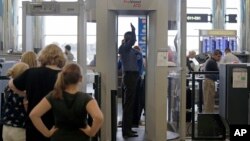The New York Times reports the U.S. Transportation Security Administration is expanding its screening of airline passengers before they arrive at U.S. airports by searching what the newspaper calls a "wide array of government and private databases."
The Times says the goal, according to the TSA, is to streamline security procedures for passengers who pose no risk. But the paper says the measures increase the government's authority to use travelers' data for domestic airport screenings in a way that previously only applied to those entering the U.S. from elsewhere.
It says the screenings go beyond the background checks the TSA has conducted for years - comparing a passenger's name, gender and date of birth to terrorist watch lists. The Times reports the search now includes using a traveler's passport number and other identifiers to access a system of databases maintained by the Department of Homeland Security.
The paper says the databases the TSA uses can include records like car registrations and employment information.
But in an Internet blog post Tuesday, the agency denied it was expanding the type of information it uses for pre-screening, saying it is not using car registrations, employment information or "private databases."
But the TSA did not deny using government databases for the checks. And it said some passengers who have not signed up for the agency's pre-screening program, known as TSA PreCheck, are still getting the program's "expedited screening benefits." The agency said it is providing those benefits using each passenger's name, date of birth and gender, which it described as information travelers have provided for years.
Under the TSA PreCheck program, people can sign up for a background check and pay a small fee to receive expedited screening, allowing them to keep their shoes, belts and coats on and their laptops in their bags.
The TSA blog team says the goal of such programs is to improve passenger's traveling experiences, moving from a "one-size-fits-all" security approach to one that provides "a much larger part of the traveling population" the opportunity for "faster" security and "less hassle." The statement said the agency has "a very high bar" when it comes to protecting travelers' civil liberties.
But The New York Times said privacy groups it contacted expressed concern about the security agency's "widening reach."
The TSA was created after the September 11, 2001 attacks on the United States, when al-Qaida terrorists hijacked four U.S. commercial airliners, flying two into the twin towers of the World Trade Center in New York and one into the Pentagon, outside Washington. The fourth plane crashed in a field in Pennsylvania.
The Times says the goal, according to the TSA, is to streamline security procedures for passengers who pose no risk. But the paper says the measures increase the government's authority to use travelers' data for domestic airport screenings in a way that previously only applied to those entering the U.S. from elsewhere.
It says the screenings go beyond the background checks the TSA has conducted for years - comparing a passenger's name, gender and date of birth to terrorist watch lists. The Times reports the search now includes using a traveler's passport number and other identifiers to access a system of databases maintained by the Department of Homeland Security.
The paper says the databases the TSA uses can include records like car registrations and employment information.
But in an Internet blog post Tuesday, the agency denied it was expanding the type of information it uses for pre-screening, saying it is not using car registrations, employment information or "private databases."
But the TSA did not deny using government databases for the checks. And it said some passengers who have not signed up for the agency's pre-screening program, known as TSA PreCheck, are still getting the program's "expedited screening benefits." The agency said it is providing those benefits using each passenger's name, date of birth and gender, which it described as information travelers have provided for years.
Under the TSA PreCheck program, people can sign up for a background check and pay a small fee to receive expedited screening, allowing them to keep their shoes, belts and coats on and their laptops in their bags.
The TSA blog team says the goal of such programs is to improve passenger's traveling experiences, moving from a "one-size-fits-all" security approach to one that provides "a much larger part of the traveling population" the opportunity for "faster" security and "less hassle." The statement said the agency has "a very high bar" when it comes to protecting travelers' civil liberties.
But The New York Times said privacy groups it contacted expressed concern about the security agency's "widening reach."
The TSA was created after the September 11, 2001 attacks on the United States, when al-Qaida terrorists hijacked four U.S. commercial airliners, flying two into the twin towers of the World Trade Center in New York and one into the Pentagon, outside Washington. The fourth plane crashed in a field in Pennsylvania.





